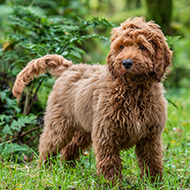Study identifies misconceptions behind designer dog boom

The most common crossbreeds acquired between 2019 and 2020 were cockapoos, labradoodles, cavapoos, sprocker, and goldendoodles.
Perceptions that designer dogs are hypoallergenic, easy to train and good with children fuelled the staggering demand for such breeds between 2019 and 2020, according to new research.
The study led by the Royal Veterinary College (RVC) also suggests that the high demand for designer crossbreed dogs during this time led to poor breeding and buyers unintentionally supporting the cruel trade in puppy farming.
Researchers hope their findings, published in Canine Genetics and Medicine, will further understanding about why designer dogs are increasing in popularity and help the profession educate the public about responsible puppy buying.
Dr Rowena Packer, a lecturer in companion animal behaviour and welfare science at the RVC said: “The UK public are flocking towards designer crossbreeds based on perceptions that they are ‘off the shelf’ easy family dogs; trainable, healthy, and hypoallergenic dogs that fit into their owners’ existing lifestyles. Unfortunately, it is unlikely that reality will meet all of these high expectations, with little evidence to support these claims.
“These misconceptions risk poor outcomes for both dogs and their owners in the future, including rehoming, unexpected health problems and bite risks. Would-be owners should avoid being enticed by designer labels and rose-tinted expectations, and instead conduct thorough research to help decide if these are really the dogs for them.”
In the study, researchers at the RVC and the University of Nottingham surveyed 6,300 owners across the UK who acquired a puppy between 2019 and 2020. Of these, 1,575 owned designer crossbreeds, with the most common being the cockapoo, labradoodle, cavapoo, sprocker, and goldendoodle.
Other key findings from the study show that the owners of designer crossbreeds:
- prioritise convenient purchasing of their dog over welfare factors
- were less likely to be provided with DNA and veterinary screening tests for their puppies’ parents by their breeder
- were more likely to source their puppy online, via a general selling website or an animal-specific selling website.
Other issues include a potentially increased rate of relinquishment of designer crossbreeds in the future, as owners realise the reality of their misconceptions.
Dr Dan O’Neill, an associate professor in companion animal epidemiology at the RVC said: “Sadly, designer dogs often do not come from ‘designer’ breeding programmes but are farmed indiscriminately to meet the current craze for breed-crosses with catchy names such as Frug and Jackalier. Check out the seller before buying, visit your puppy several times before you bring them home, and always make sure you see the puppy with its mum.”



 The Veterinary Medicines Directorate (VMD) is inviting applications from veterinary students to attend a one-week extramural studies (EMS) placement in July 2026.
The Veterinary Medicines Directorate (VMD) is inviting applications from veterinary students to attend a one-week extramural studies (EMS) placement in July 2026.